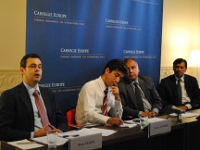Registration
You will receive an email confirming your registration.
IMGXYZ2567IMGZYXDespite unprecedented support from the European Union and the IMF, the euro crisis that began in Greece has quickly engulfed Europe and now threatens the future of the euro. The euro crisis strikes at the heart of the world’s largest trading block and will have ramifications on the rest of the world, from the United States to emerging economies like Turkey and India.
In an event hosted by Carnegie Europe, Carnegie’s Uri Dadush was joined by His Excellency Jaimini Bhagwati, Indian ambassador to the European Union and to Belgium, and Sinan Ülgen, Visiting Scholar at Carnegie Europe and chairman of the Istanbul-based Centre for Economics and Foreign Policy Studies (EDAM), to discuss the effects of the crisis on the world economy and on its trading partners. The discussion was moderated by Carnegie Europe’s Fabrice Pothier.
Causes of the Crisis
- Soaring Confidence: When Greece, Italy, Ireland, Portugal, and Spain (GIIPS), joined the Euro, interest rates declined and the expectation was that their economies would converge with those of richer countries in Europe, in terms of both income and stability. However, though incomes rose, Dadush explained, expectations ran ahead of reality and these economies remain today less stable than the European core.
- Loss of International Competitiveness: The surge in domestic demand that accompanied Euro adoption caused prices of domestic services to rise relative to internationally traded products and of labor to rise relative to productivity.
- Inadequate Policy Response: When interest rates fell and growth accelerated, governments increased their expenditure. In Greece, fiscal management was disastrous. Although competitiveness deteriorated, structural reforms tended to lag. Ultimately, Dadush argued, the underlying rate of GDP growth, which was driven excessively by domestic activities, was not sustainable, and the fiscal problems escalated.
Global Impact: The View from Turkey and India
- Turkey: Turkey escaped the crisis relatively unharmed, and while growth decelerated in 2009, it soon rebounded. Effective oversight of banks, as well as the implementation of a strong regulatory policy, resulted in few problems in the banks. A primary budget surplus helped weather the storm. However, Turkey is now concerned by sustainability of its growth given the health of its EU trading partners, Ülgen explained. It recognizes that the crisis could lead to a more introverted Europe, diminishing the prospect of Turkish membership in the EU.
- India: When the 2008 U.S. financial crisis caused problems in Europe and throughout the world, trade credit in India began to dry up. The Indian Central Bank had to help, but the government’s large fiscal deficit and debt deterred adoption of large scale fiscal stimulus. The fall in trade depressed demand for India’s exports, though since India’s economy remains heavily dependent on domestic demand, this effect was modest. On the other hand, India which is heavily dependent on imported oil - benefited from the large drop in oil prices from $140 a barrel, to $40 a barrel during the worst of the crisis.
Course of Action
- Use Available Tools: The troubled countries cannot devalue or monetize their deficits. On the other hand, their adjustment is impeded by inflexible labor markets and the EU has limited EU-wide fiscal tools at its disposal to help. It follows that Eurozone members must use the tools available to them much more aggressively, Dadush stated. This includes painful measures, including large scale fiscal consolidation, wage cuts, and structural reforms designed to increase competition in both labor and product markets.
- EU-wide: European monetary policy must remain expansionary and favor a Euro decline. Germany and other surplus countries should take active measures to stimulate domestic demand. Bahgwati indicated that larger economies like Germany have the ability to support the smaller ailing European economies.
- International Assistance: The Euro crisis represents the largest risk to the global economic recovery, and the US and the IMF must continue to offer assistance. Dadush suggested that if the crisis were to spread to Italy and Spain, it could have a devastating impact on the European banking system, and cause another global credit crunch.
